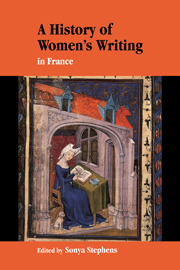Book contents
- Frontmatter
- Contents
- Notes on contributors
- Introduction
- 1 Female voices in convents, courts and households: the French Middle Ages
- 2 To choose ink and pen: French Renaissance women's writing
- 3 Altering the fabric of history: women's participation in the classical age
- 4 The eighteenth century: women writing, women learning
- 5 Eighteenth-century women novelists: genre and gender
- 6 The nineteenth century: shaping women
- 7 1900–1969: writing the void
- 8 From order to adventure: women's fiction since 1970
- 9 Changing the script: women writers and the rise of autobiography
- 10 Women poets of the twentieth century
- 11 Voicing the feminine: French women playwrights of the twentieth century
- 12 Feminist literary theory
- Bibliographies
- Index
5 - Eighteenth-century women novelists: genre and gender
Published online by Cambridge University Press: 25 September 2009
- Frontmatter
- Contents
- Notes on contributors
- Introduction
- 1 Female voices in convents, courts and households: the French Middle Ages
- 2 To choose ink and pen: French Renaissance women's writing
- 3 Altering the fabric of history: women's participation in the classical age
- 4 The eighteenth century: women writing, women learning
- 5 Eighteenth-century women novelists: genre and gender
- 6 The nineteenth century: shaping women
- 7 1900–1969: writing the void
- 8 From order to adventure: women's fiction since 1970
- 9 Changing the script: women writers and the rise of autobiography
- 10 Women poets of the twentieth century
- 11 Voicing the feminine: French women playwrights of the twentieth century
- 12 Feminist literary theory
- Bibliographies
- Index
Summary
It would be possible to write a history of the eighteenth-century French novel which referred only to works by women. The result would be a rather strange route-map, with some of the dominant features of the landscape blotted out (no Marivaux, Prévost, Diderot, Rousseau, Laclos), but it would cover most sub-genres of the novel and give a reasonably accurate indication of the evolution of the genre over the century. As eighteenth-century readers and critics knew, women were not occasional and marginal novelists. They were part of the mainstream.
Women were successful as novelists partly for negative reasons: the problems of apprenticeship and work opportunities made a career in music, painting or as a playwright a difficult one for a woman.* By comparison, the novel allowed a more ready outlet for their creativity. This is not to suggest that the genre offered dilettantes an easy opportunity to publish. Many eighteenth-century women novelists lived by their pen, often out of necessity, had to negociate with publishers and agents, promote their works, and, in a general way, develop their name and reputation – for many, writing novels was a profession.
The success of women novelists was in part the result of a double depreciation, of the genre, and of women. The critical establishment of the period was male, and conservative. It viewed the novel as a parvenu genre.
- Type
- Chapter
- Information
- A History of Women's Writing in France , pp. 102 - 119Publisher: Cambridge University PressPrint publication year: 2000



